Celebrating Durham’s Black-Owned Farms and Markets
Durham's Black-owned farms and farmers markets are a vital community treasure, offering unique produce, homemade canned goods, and... Read More
Some of Durham’s small businesses are on a mission to change the world – through conscious hiring practices, a focus on sustainable sourcing and practices and more.
Posted By Kristin Bedinger on Oct 29, 2024
In Durham, our values and character are more than just talking points. Murals tell the stories of our city’s history and important figures, locals creatively compete to preserve ecological landmarks and our farmers’ markets serve as major meeting places. Durham’s authenticity is also apparent in our small businesses. Across the Bull City, our small business owners work every day to share their cultures and align their business practices with their ethics and beliefs through local sourcing, paying fair wages and more.
There are more businesses doing good in Durham than we will ever be able to exhaustively name in one blog piece, but we’ve included a sampling of public-facing Durham businesses whose identities are defined by the desire to promote equity, positivity and sustainability in the world. These mission-driven businesses prioritize their chosen causes above all else; you could even say they were built for this purpose.
Part & Parcel is a package-free grocery store with a dual mission – it seeks to reduce food packaging waste by carrying bulk grocery, cleaning and personal care products, many of which are sourced locally, and it serves as a model of neurodiversity. Run by the non-profit Autism Support and Advocacy Center, the store is an affirming workplace that works to ensure all employees feel seen, valued and respected. A visit to the store is an education in the Triangle’s producers and makers, with more than 25 locally made products represented. Located in the Lakewood neighborhood, Part & Parcel is near the Scrap Exchange, where you’re sure to find a second-hand container or two there if you’re in need before wandering in to shop the bulk goods.
Certified B Corporations prove their commitment to inclusivity, equity and sustainability by qualifying for the label based on the B Lab’s measures of social and environmental impacts. Durham’s B Corps have met the organization’s high standards by passing a risk review, committing to accountability to all stakeholders and exhibiting transparency in participating in the assessments. These businesses have proven their commitment to their values through transparent, measurable results of their good work.
Downtown Durham’s most stylish boutique does much more than keep the city’s well-clad up-to-date in the latest trends from independent designers – that’s just the vogue in Vert & Vogue. Vert points to the store’s commitment to sourcing mindfully-made products and championing green innovations in design and personal style. A certified B Corp since 2017, Vert & Vogue shows their commitment to transparency by publishing its annual impact report, measuring its performance against its goals, sharing its wins and challenges, and publishing its intention to source 50% of its apparel collection from woman-owned brands.
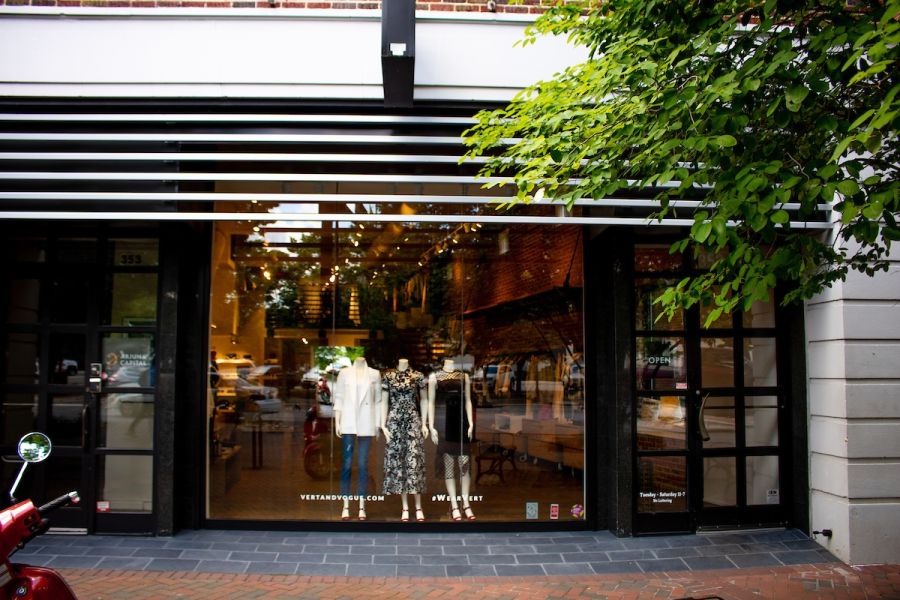
Shop at Vert & Vogue for fashionable clothing sold with sustainability and equity in mind. Photo: Discover Durham
Bull City Burger and Brewery was the first Certified B Corp restaurant in North Carolina and the first B Corp brewpub in the world! Though now a former B Corp, the restaurant proudly commits to sustainability by sourcing locally from farms and producers with mindful practices, and the chefs there make everything (except for the ketchup) in-house – down to the hotdogs. To minimize the environmental impact of its operations, it diverts waste from the farms it partners with by feeding spent grain from the brewing process to livestock, fryer oil becomes bio-diesel and food waste feeds local pigs.
While Firsthand Foods doesn’t have a public storefront, you’ll find their humanely raised meat in grocery stores and on restaurant menus around Durham. A leader in sustainable agriculture in North Carolina, Firsthand Foods only sells humanely raised meat. The farmers they partner with raise their livestock outdoors on pasture and their processors are small in scale. The women-owned Firsthand Foods has created a new model for the meat supply chain – one that promotes honest dialogue and collaborative decision-making.
Firsthand Foods also works closely with chefs in our community to provide feedback on the products to the farmers who raise the animals, allowing them to adjust their practices to improve the product. This thoughtful, hands-on management allows small, family-run farms to thrive in a system that typically pushes farmers into larger-scale operations to succeed. When you see Firsthand Foods on a menu at a Durham restaurant, you can trust that you’ll be eating high-quality, sustainably raised meat.
Like Firsthand Foods, Happy Dirt is a woman-led business disrupting the organic produce supply chain by working with small, regional farms to improve farming practices and make fresh, organic fruits, vegetables and pantry goods more available throughout the year. Happy Dirt products are sold at grocery stores and distributed to restaurants in Durham and beyond. Their targeted buying practices and advocacy for fair pricing means that the producers they purchase from are supported while the products are available to more customers.
For more on Durham’s green businesses and attractions, read our Green Guide to Durham.
Winner of ten Good Food Awards as of 2023, Fullsteam is a trailblazer in the North Carolina craft beer scene. It remains the only North Carolina brewery to win a Good Food Award, and this status is an appropriate indication of the thoughtful operational practices it has implemented. End to end, Fullsteam owner Sean Lily-Wilson, four-time James Beard Award nominee, considers how he can close the loop, eliminate waste and promote good in the beer production process.
The brewery works with a local composting company to divert waste; sweet potatoes, grain and malt, hibiscus flowers and pawpaws are sourced from North Carolina producers; ingredients are foraged from the preserved, public land at Brumley Forest and donate proceeds back to the preservation of the land. Not just a gimmick, Fullsteam walks the walk of sustainable practices and works each year toward the goal of spending $500,000 per year on local ingredients.
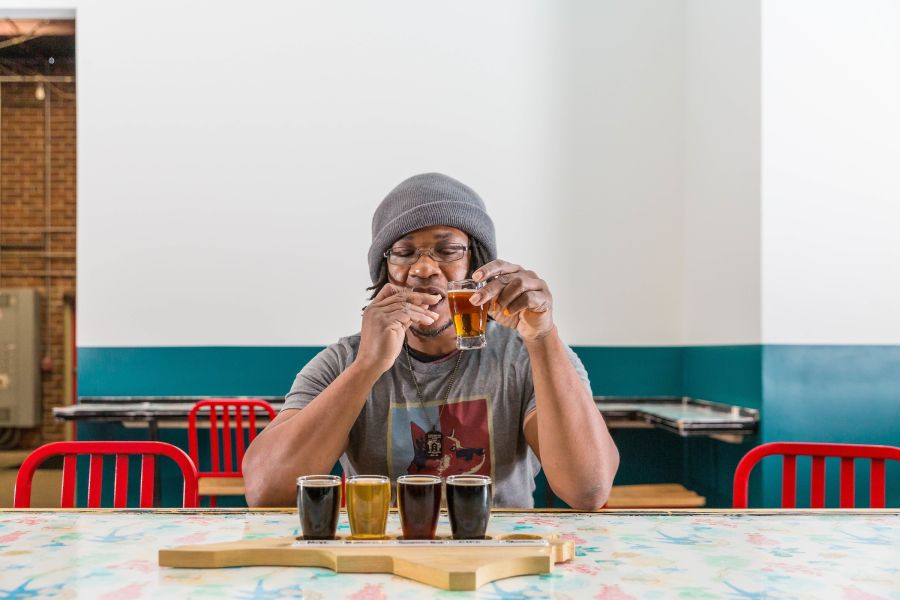
Savor a flight of sustainably crafted beer at Fullsteam Brewery. Photo: Fullsteam Brewery / Discover Durham
Lakewood neighborhood landmark The Scrap Exchange is one of the largest creative reuse centers in the country and has been collecting materials from businesses and residents and giving them a second life since 1991. The Scrap Exchange not only diverts waste but also creates jobs and promotes creativity within the Durham community. A walk through the facility is an awe-inspiring exploration of how we think about objects that could easily be seen as trash. Meticulously sorted barrels of bits and bobs are suddenly filled with potential. The Make-and-Take Room allows visitors to see their ideas come to life, and The Artist Market sells art and handmade goods created by local artists.
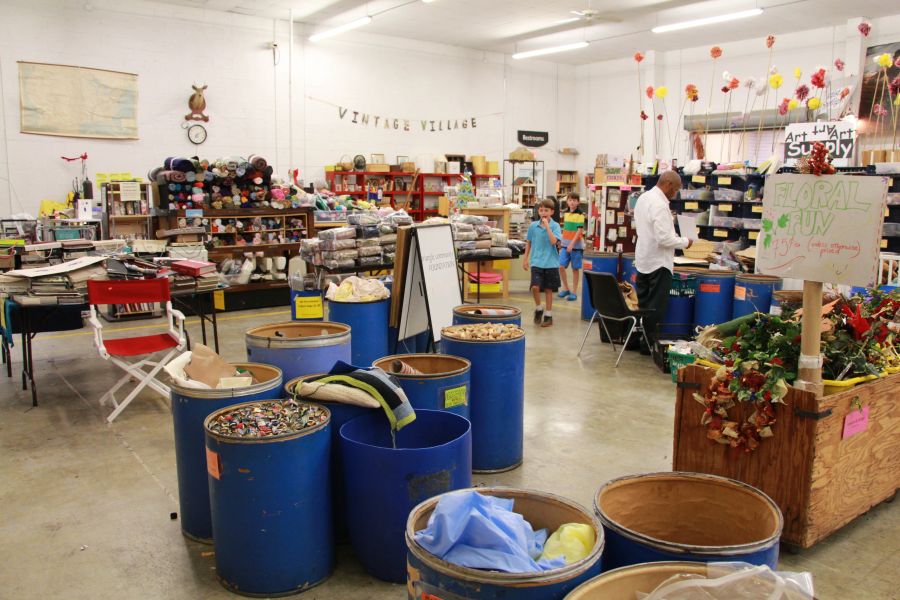
Find everything you need for your next work of art at The Scrap Exchange. Photo: Discover Durham
Fillaree is a woman-owned manufacturing company working to make green cleaning and personal care products a reality. Here in Durham, a Fillaree storefront offers the full line of products as well as transparency into the company’s manufacturing processes while like-minded shops around the city dedicate space to Fillaree filling stations where customers can bring their own bottles to refill their supply. Customers across the country can order refills by mail and return the bags to be washed and reused by the company (for free!). The best part is that the products are effective, gentle, smell great, are certified to kill harmful bacteria and are safe for waterways.
Mystic is a farm-based producer of distilled spirits where land stewardship and environmental sustainability are priorities, guiding the processes of making the spirits they produce. The production is powered by a 50kw solar power system, making it the largest solar-powered bourbon distillery in the world. All – yes, all – of the grain used in the distilling process is grown by Mystic on 108 acres near the distillery. The products used in the mashing and distilling process use only natural products, making it possible to feed the by-products of the process to local livestock. Oak barrels are from Appalachia, labels are printed locally and pallets are recycled.
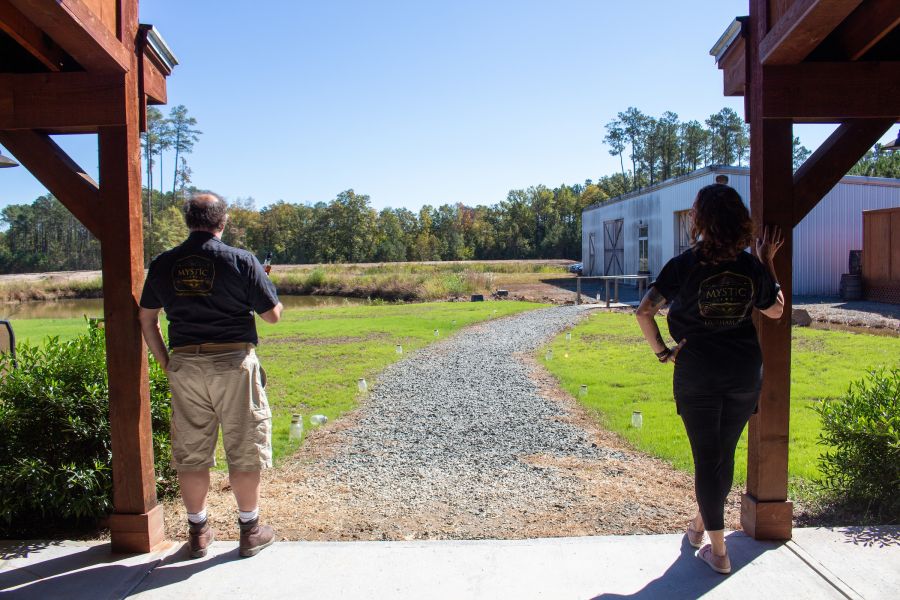
Mystic Farm & Distillery's process makes them a truly one-of-a-kind distillery. Photo: Discover Durham
Don’t Waste Durham’s GreenToGo program is revolutionizing the footprint of our local takeout scene. The service provides reusable containers to restaurant partners around town, and members can pick up to-go orders in the containers rather than disposables. There are drop-off containers around the city where members can turn in used containers to be washed and re-distributed to restaurants. Though the subscription-based model is geared toward residents, even visitors can get the warm fuzzies knowing they’re dining with a restaurant that takes the extra step to make this service available to diners who want to reduce their contribution to the landfill.
Auroraflow is more than your typical spa; it is a wellness center dedicated to embracing diverse bodies and making sure that wellness is accessible to all types of people. While it offers many of your typical wellness center offerings like massages and facials, Auroraflow also provides its community with herbal medicine consultations, fire cupping, acupuncture and more. The team at Auroraflow has been hand-picked to ensure that every employee shares the company's values.
Cocoa Cinnamon coffee shops and Little Waves Coffee Roasters are independently owned and operated, Latina co-owned, women-forward and heart-driven company that incorporates the personal narratives of the owners, suppliers and clients into their spaces and offerings to connect. The owners’ deep humanity shines through in the roaster’s relationships with coffee growers around the world as much as the company’s friendly faces represent Durham’s diversity. Not only that, but they show a commitment to sustainability through contributing coffee compost to local gardens and farms and choosing energy-efficient equipment.

Grab an excellent cup of coffee at any one of Cocoa Cinnamon's locations. Photo: Eric Waters / Discover Durham
Bull City Fair Trade is a non-profit, fair trade gift store where you can shop by cause or country, contributing your dollars to empowering women, aiding refugees, helping small farmers, fund education and more. In their 31 years of operation in Durham, they have stocked products from 43 countries of origin, partnering with 85 artisans around the world.
In 2022, the store donated over $4,000 to local nonprofits. The shop’s fair-trade practices show their commitment to creating safe working conditions, respecting cultural identity, ensuring the rights of children, cultivating environmental stewardship and more. When you browse the Ninth Street shop, you’ll take a trip around the world, finding unique gifts for your loved ones and supporting a good cause at the same time.
Soul Sanctuary is an event venue and farm collective whose vision of an intentional community offers accessible housing, food security and supportive spaces for LGBTQIA+ Elders. Its flexible, indoor and outdoor event spaces allow flexibility for groups of different sizes and a variety of needs and strive to be accessible for BIPOC and Queer community-centered events. The two-story farmhouse provides a beautiful space for retreats and reunions, while it’s easy to imagine an outdoor concert on the lawn. The land is also used as a farming collective to support emerging farmers, culinary businesses and producers.
Trosa is a nonprofit residential recovery program in Durham that provides work opportunities and support to individuals with substance use disorder. The Trosa Thrift Store supports this mission and makes Trosa’s services accessible and cost-free to as many people as possible. The Trosa Thrift Store is a beloved north Durham shop where secondhand enthusiasts shop for gently used furniture, housewares, clothing and more. This is your spot if you want to purchase a used piano. There’s an entire grocery store-sized floor of sofas and chairs in great shape. You can even have your new-to-you art reframed at the low-cost framing shop onsite.
Durham’s arts scene is a vibrant expression of the diverse communities and cultures that converge here, and Durham Arts Council (DAC) leads, inspires and promotes excellence in and access to the arts for all who live in and visit our community. The DAC ensures creativity and the arts are highly valued by building an environment for artists and arts organizations, expanding arts education in and outside of schools and advocating for the arts within the community. For visitors to Durham, the DAC’s influence can be felt even when it’s not seen, and it can be directly experienced by visiting the exhibits in the organization’s four permanent galleries at 120 Morris St. downtown, or by attending one of the various Third Friday Art Walks, holiday makers’ markets or the organization’s flagship annual fine arts festival, Centerfest.
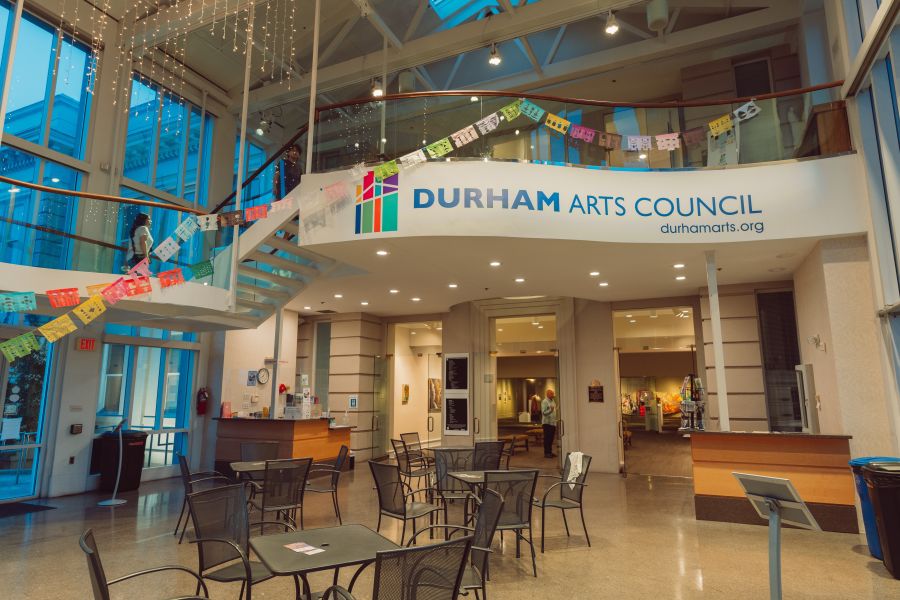
The Durham Arts Council is a pillar of Durham's art community. Photo: A.J. Alston
The Eno River Association is a non-profit dedicated to preserving the natural, cultural and historical resources across 7,500 acres in the Eno River Basin in Durham and Orange counties. Some of Durham’s most cherished parks for outdoor recreation, natural enjoyment and education exist due to these efforts.
Visit West Point on the Eno, Penny’s Bend, the miles of the Mountains to Sea Trail that cross Durham County, Little River Regional Park and Eno River State Park to experience the beauty of the preserved land. If you’re in Durham for the Fourth of July, take part in the Festival for the Eno, the Association’s annual celebration and fundraiser featuring musical acts, art and food vendors, and plenty of space to enjoy the river and trails at West Point on the Eno over two days.

The Eno river remains a Durham treasure in large part due to the efforts of The Eno River Association. Photo: SP Murray
Beyu Food Project, originally Feed DURM Collective, was initially an emergency alliance among downtown Durham’s small restaurant businesses in response to the COVID-19 pandemic, providing hundreds of thousands of meals to provide healthy, free meals to children whose school cafeterias were closed and neighbors who were out of work, no questions asked. As food insecurity remains an ongoing issue, the project has continued operating. A portion of the proceeds of Beyu Caffe signature blends and single-origin coffees supports these efforts.
By their very nature, Durham’s hospitality businesses are here to serve Durham’s residents and visitors, and many of them go above and beyond to serve our community beyond business as usual. This fall, we talked to three local business owners, including Dorian Bolden of Beyu Food Project, who created innovative programs to provide meals for anyone who needed them during the COVID-19 pandemic. Hear their stories in the video above.
Do you know of another visitor-friendly, mission-driven Durham business that should be included on this list? Email us at blog@discoverdurham.com.
Celebrating Durham’s Black-Owned Farms and Markets
Durham's Black-owned farms and farmers markets are a vital community treasure, offering unique produce, homemade canned goods, and... Read More
In Durham, “going green” means community-wide efforts to implement sustainable and environmentally-friendly practices to ensure resources... Read More
Bull City Staples: Legacy Durham Businesses
A new renaissance is brewing in Durham, but that beauty has been blossoming in business well before this recent resurgence. Read More